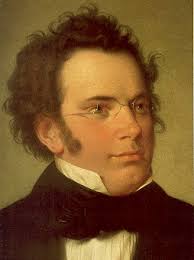This autumn’s Festival runs for three weeks with performances every day. As a consequence this review can only give a taste of what was on offer, but it does focus on the key feature of the 2014 festival – The Schubert Project – a performance of every song written by the composer within a single Festival. No mean feat in itself and a tribute to the organisers, in particular Sholto Kynoch who seems to have been at everything even if he was not actually performing.
I spent most of two days in the middle of the festival, arriving on Thursday 16 October in time for the lunchtime recital at the Holywell Music Room which was given over to songs dedicated to Therese Grob, Schubert’s first great love. The songs were shared between soprano, Raphaela Papadakis and baritone, Martin Haessler with Sholto Kynoch at the piano. For a collection dedicated to a loved one there are some very dark songs here, though the baritone’s Zufriedenheit Lied and Mailied provided some relief, and the radiant Litanei auf das fest aller seelen for soprano brought the recital to a fine climax. The recital itself was a very relaxed occasion, enabling minor slips to be easily encompassed and forgiven.
Only a brief respite for lunch before joining the afternoon master-class at St Columba’s URC Church on Winterreise given by Sarah Walker. During the morning she had worked on the first twelve songs and now moved to the second part of the cycle. There were to have been three different singers and accompanists giving us four songs each but as one had had to drop out one pair returned for the final four songs. Sarah Walker’s deep understanding of the cycle and her gentle humour carried us through the emotional turmoil of the songs and the immense challenges they bring for a young singer. She stressed the need to be aware of the connections between the songs, allowing the former to influence the opening of the next. As an example she drew attention to the bleakness of the ending of Einsamkeit which must spill over into any enthusiasm the singer might want to bring to Die Post. She warned against becoming too excited, stressing that less is more in almost every case when approaching the cycle as a whole.
By a sound piece of planning, Ian Bostridge sang Winterreise that evening in the Holywell Music Room accompanied by Thomas Ades. The singer’s platform manner is challenging throughout; he seems ill at ease, ungainly, frequently turns away from the audience or clutches the piano as if his life depended upon it. There is real pain and anger as the cycle proceeds, a bitterness which never degenerates into self-pity but is none the less terrifying to behold. Unlike some approaches there is no hint here of madness or despair. The singer is open to all that life can throw at him and the only tiny crumb of comfort comes in the last two lines when he asks to share his grief with the hurdy-gurdy man. It is a masterly rendition, made all the more so by the succinct and always subtle accompaniment of Thomas Ades. There will always be room for many ways to present this cycle, but there can surely be few today which are as moving or as powerful.
The following Saturday I attended the second lecture recital given by Graham Johnson in the Jacqueline du Pre Music Building which focused on Schubert’s compositions in 1816 and 1817. There were full musical examples from Raphaela Papadakis, Robin Tritschler, Robert Murray and Benjamin Appl, including lengthy extracts from Ossian set as chamber operas intended for solo voice. These were split across the soloists to give a more focused dramatic impact and it would be fascinating to see them staged or filmed. Schubert’s sense of drama is finely developed here and his flowing arioso style closer to early Wagner than the more obvious Italian models he was used to.
Graham Johnson stressed the ever expanding nature of research, noting that even today changes are being made to accepted texts and the singers gave us the most recent scholarly versions known. He traced the move that Schubert was able to make from his own home to stay, on invitation, with the Schobers and the devastating impact of having to return home at the end of 1817. We were encouraged to hear the impact these moves had upon his compositions during the two years and the range of poets from whom he drew. Towards the end of the time his work with the singer Vogel moved his settings into more classical territory as these appealed to the singer. However there is still a propensity to create music which is underpinned by dance rhythms and these shine through. Graham Johnson drew our attention to the setting of Atys which speaks of a young man out of his comfort zone, and compared this to the Miller in the song cycle, stressing that the Miller is as much an outsider, an inadequate, as Attis himself. While many of the songs we heard were rare, the afternoon ended with An die Musik, preparing those of us able to stay on, for the evening Schubertiad.
Details of events still to be held – www.oxfordlieder.co.uk




